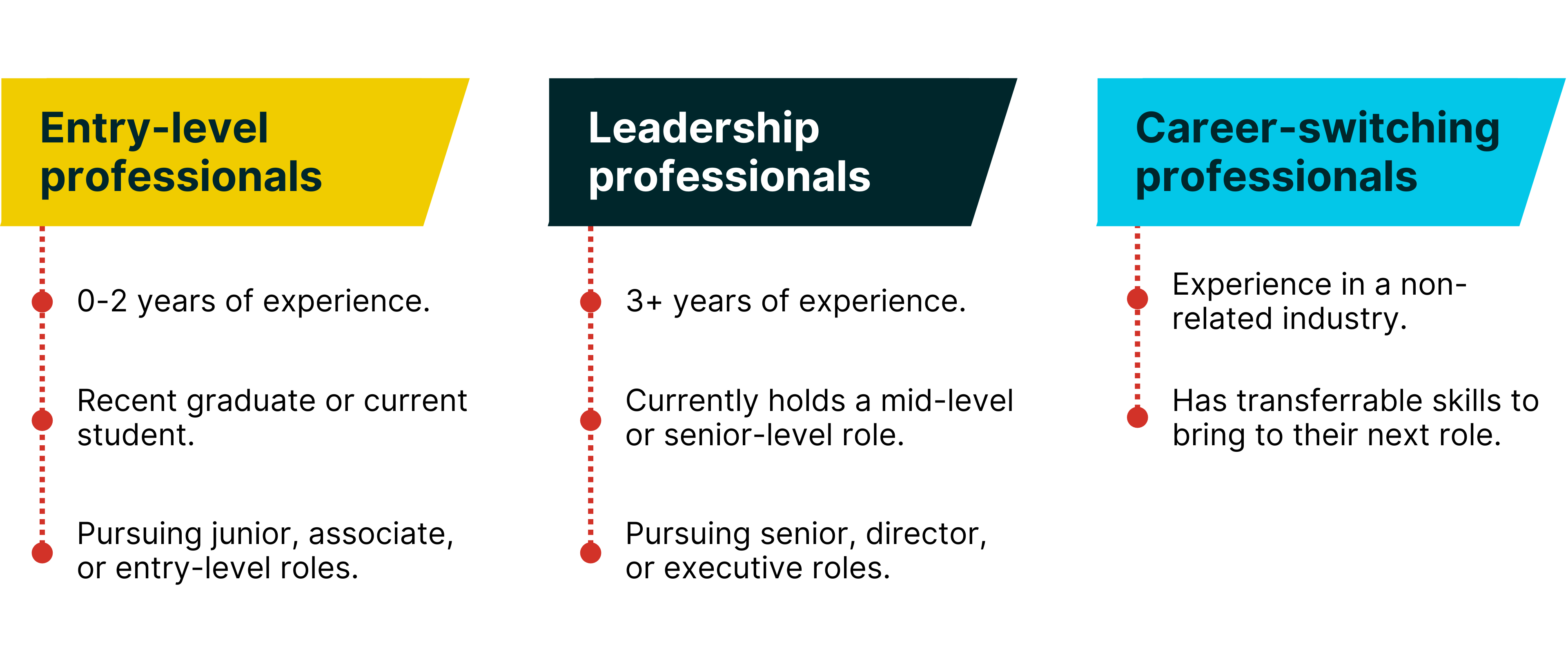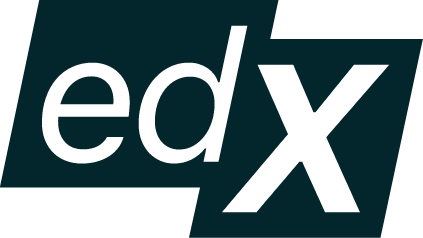
Competitive candidates understand how to speak confidently about their technical and transferable skills in ways that sell their professional value to employers. Not there yet? Let us help.
View more details about how to prep for an interview and general interview questions in our Behavioral interview prep guide. Use this resource to prepare for questions you may be asked when interviewing for roles in the business field.
This guide provides a list of sample interview questions and tips on how to build your responses to common interview questions in the technical hiring process.
Interview questions by category
We have categorized the interview questions into three sections. Feel free to read straight through or jump to the sections that interest you most.
Tell me about yourself.
Give a snapshot of your work history. Think about your past (previous experience and education), present (your current job and how it’s preparing you for this role), and future (why you want the job you’re interviewing for). Your snapshot should show the interviewer how your experiences equip you with the skills to succeed at their company and why you are interested in the specific role.
What are your greatest strengths and weaknesses as a coding professional?
Consider the job description and the required skills in the posting, and align your answer with a skill you’ve mastered. Discuss your areas of expertise and how they will benefit the organization, team, or position. For weaknesses, discuss a skill that you are actively working to improve. Explain the steps that you have already taken to improve this skill and the success that you have already achieved.
Why do you want this job?
Demonstrate that you’ve researched the company, and express what you like about it and why your skills would be a good fit for the job. Explain how the role will contribute to your career progression and what you can contribute to the team. Be specific and enthusiastic about potentially working for the company.
Where do you see yourself in five years?
This question is designed to probe your career goals and vision. First, tell your interviewer about your career aspirations and ambitions. Then, express your desire to succeed and explain how this job will contribute to your progress. Use this question to show that you are goal-oriented and have a plan to achieve your goals.
What are your salary expectations?
Prepare thoroughly for this question. Research salary ranges for this particular job, this industry, and your geographic area. Use websites like Payscale.com or Salary.com. The interviewer wants to know how you value yourself. If possible, speak about salary only after an offer is made. If you must speak about salary expectations, ask the interviewer how they value the role before stating your expectations. Use the salary given by the interviewer as leverage to negotiate a favorable salary. Aim high but within the range you’ve researched, and be prepared to provide examples of why you’re worth the salary you cite.
Pro tip:
Salary negotiation is a hot topic these days. Check out our Salary negotiation guide to learn more about earning what you are worth.
Name a website or app that annoys you. How would you improve it?
This question allows you to show your attention to detail and problem-solving skills. Quickly describe the website or app that annoys you, and then spend most of your time discussing the improvements. Remember, it is best to use positive language throughout an interview! When discussing improvements, demonstrate that you have the skills to implement these improvements.
Describe Big-O Notation.
Interviewers ask this question to understand how important efficiency is to you as a developer. First, describe Big-O Notation, and then follow up by explaining how you write efficient programs. Consider using the STAR Method to discuss a time that you optimized your code.
How would you describe APIs to a non-technical person?
Questions asking developers to describe a technical topic to a non-technical person test the developer’s communication skills. Your answer should show that you can effectively discuss your technical projects with various stakeholders. Consider using the STAR Method to discuss a time you collaborated with non-technical stakeholders. (Learn more about the STAR Method in our Behavioral interview prep guide.)
What is your experience with SQL?
This question can be tricky if you are a career starter or switcher. You may want to downplay your skills; however, interviews are not the time to be humble. When answering this question, give an honest answer about your skills and your ability to learn new skills without overstating your qualifications.
Write an algorithm that does _______.
Questions requiring you to write code often occur during whiteboard interviews or online technical assessments. We recommend you take the following steps to answer these questions.
- Repeat the question, and ask clarifying questions.
- Write the pseudocode for your algorithm.
- Write the code.
Pro tip:
You will find that some employers include technical screenings as a part of the hiring process. Technical screenings are an opportunity for you to demonstrate your technical skills in the form of an assessment, live interview, or take-home project. Learn more about technical screenings in our Technical screening guide.
Employers may ask you questions specific to your experience level in the industry. The following sample interview questions are specific to entry-level professionals, leadership professionals, and professionals switching careers.

Interview questions for entry-level professionals
Tell me about a project that you are especially proud of.
Choose a course project or personal project that highlights your skills and relates to the responsibilities of the role that you are applying for. Use the STAR Method to craft a concise yet thorough project description. Your answer will show the employer what you consider excellent work and how you would bring these standards and skills to their team. Don’t be afraid to bring up mistakes you’ve made as long as you emphasize the lessons you learned.
How do you stay abreast of industry trends?
This is an excellent opportunity to show that you are passionate about coding and willing to put forth the extra effort to stay current on the latest news and trends in the industry. Cite three to four ways you track the industry and how each process or tool benefits you.
How do you ensure that there are no errors in your work?
This question assesses your competency in dealing with and resolving problems. First, describe the processes and tools you use to ensure your code is error-free. Then use the STAR Method to describe a situation when you used these processes and tools to resolve an error.
Interview questions for leadership professionals
Why do you want to be a leader in our company?
Your response gives the interviewer a sense of how you’ve conceptualized this leadership role and if you’re ready for the responsibilities. They may also want to assess how well your professional values align with the company values. Discuss what you enjoy about being a leader and/or experiences that have prepared you for leadership.
What management framework and technologies do you use when managing projects?
This question gives the interviewer an understanding of how you approach projects and how your approach may add value to the company. First, discuss your preferred management framework (ex. Agile, Scrum, or Kanban) and the tools you use to execute these frameworks (ex. Jira or GitLab). Then use the STAR Method to demonstrate how your strategy leads you to success.
How do you respond to constructive feedback on your projects?
The process of writing code usually requires several rounds of corrections. Show the interviewer that you value and seek out constructive criticism. Use the STAR Method to discuss a time when you received positive feedback and how you used it to improve the project.
Expert advice
“Practice talking about yourself while recording yourself on the phone or while driving in your car by yourself. By doing this, can start identifying key concepts and ideas that you can incorporate into interviews.”
– Deanna P., career expert at edX

Interview questions for career-switching professionals
Why are you leaving your current job or changing career paths?
This can be a tricky question; always remain positive. When discussing your current company or environment, give a truthful reason for leaving, but do not bring negativity into the discussion. Instead, focus your answer on developing and expanding your career into the tech field. Share what you’ve learned about this potential new employer and how it fits your goals, strengths, and experience well.
How do you communicate your progress to clients or stakeholders?
Your response to this question should demonstrate your understanding of the importance of updating clients and stakeholders on the progress of projects. Describe the methods and tools you use to communicate your progress. Use the STAR Method to tell a story that shows how your methods lead to successful outcomes. If you choose a non-coding related story, make sure that you point out how your methods will bring you success in your next role as a developer.
What do you believe is the most important soft skill for a coding professional?
This question is an excellent opportunity to show your transferable skills that can be applied across many industries. Choose a soft skill you possess and that is required for the position you are interviewing for. Use the STAR Method to discuss a time when you utilized this skill.



